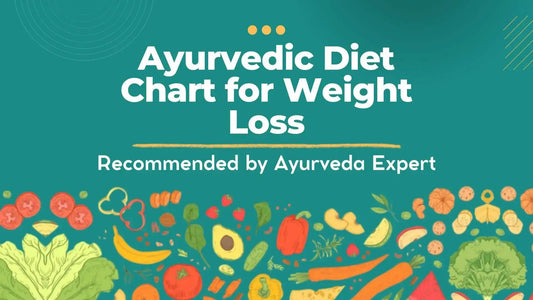
Ayurvedic Diet Chart for Weight Loss - Recommended by Ayurveda Expert
Weight loss involves losing unhealthy fat in your body, and in this process, diet plays a major role.
Diet is the food that gives you energy. Diet means eating a certain kind of food that makes you feel good and gives you energy.
If you take a healthy diet, then it will improve your mental and physical health. Diet depends on our health and body type.
In this blog, we will share some of the best benchmarks for an Ayurvedic diet for weight loss, which will help you get slim with Ayurveda without any negative impact on your body.
What is an Ayurvedic diet?
Ayurvedic diet is a kind of diet that follows the principles of Ayurvedic medicine. According to the diet plan, Ayurveda suggests what kind of food is suitable for you and which one you should avoid.
The most important thing is that if you are taking or following any advice, then first observe your body and your health. Not every diet plan is suitable for every health condition. So, it is better to consult your doctor.
According to Ayurveda, the little things we do for ourselves every day have the greatest impact on our overall health, mental state, and physical health, and eating well is one of those things. To stay healthy and fit from inside and outside, you must follow some strict diet routine.
7 Days Ayurvedic Diet Chart for Weight Loss:
This Ayurvedic diet chart for weight loss is to improve digestion (Agni), balance the body's energy (Dosha), and support general health. This diet plan emphasizes foods that will help you lose weight.
|
Days |
Morning start (empty stomach) |
Breakfast |
Lunch |
Evening Snacks |
Dinner |
|
Sunday |
Hot water and ginger tea |
Cooked oatmeal and milk like almond milk |
Rasam rice |
Moong Dal soup, |
Rice and curry |
|
Monday |
Hot water and fresh lemon juice |
Vegetable upma (semolina or suji) |
Lemon juice and green salad |
Oatmeal |
Cooked steam potato with avocado. |
|
Tuesday |
Hot water and honey |
Moong dal chilla |
Curry with rice |
Baked samosas with healthy ingredients in the stuffing |
Oatmeal with honey. |
|
Wednesday |
Hot overnight soaked jeera water |
Cooked quinoa porridge |
Vegetable fries with brown rice and tofu. |
Eating paratha with healthful fats |
Rice with cooked moong and coconut chutney |
|
Thursday |
Overnight soaked fenugreek or methi dana seed water |
Daliya (broken wheat upma) |
Vegetable biryani |
Roasted Makhana |
Warm, cooked khichdi |
|
Friday |
Saunf or fennel water |
Seasonal fresh fruit salad + nuts |
Rice with Rasam. |
Cooked peanut chaat |
Vegetable barley soup |
|
Saturday |
A pinch of cinnamon powder in lukewarm water |
Daliya porridge |
Rice with green chutney. |
Grilled mushroom tikka |
Hot cereals, like wheat cream |
Ayurvedic Diet Plan for Weight Loss as Per Doshas
Ayurveda believes in simple living and eating Sattvic food. Ayurveda believes that our body remains balanced based on different doshas, body types, proper diet plans, and maintaining a healthy lifestyle.
The Ayurvedic diet plan is a customized meal plan that aims to help lose weight and improve overall health. It emphasizes Vata, Pitta, and Kapha, which balance the body and improve digestion. A perfect healthy diet also help to gain healthy weight.
Vata Dosha: People with Vata Dosha are usually lean, thin, dry, irritable, and have a high metabolism, but they have difficulty digesting food.
Pitta Dosha: People with Pitta Dosha have a high metabolism. With the help of this, they can burn their calories easily, but they also have a very high appetite, which makes them feel hungry quickly.
Kapha Dosha: People with Kapha dosha suffer from slow metabolism but have strong stamina. Due to slow metabolism, they gain weight easily and lose it slowly.
Here Are Some of the Best Ayurvedic Diet Plans
It will guide you in effectively shedding some pounds while keeping you healthy and fit.
1. Vata-pacifying diet
The three tastes—sour, sweet, and salty—work differently to control vata in our body:
- Salty foods: Salty foods such as salty seafood and table salt increase appetite.
- Sweet foods: sweet tastes that soothe the body, such as whole grains, honey, and starchy vegetables.
- Sour foods, typically found in berries, citrus, and pickled foods, can help with digestion.
Prefer warm foods that have more sour, sweet, and salty tastes to work well.
2. Pitta-pacifying diet
Try eating plenty of sweet, bitter, and astringent foods that balance the pitta doshas.
- Astringent foods: include green apples, lentils, beans, and pomegranates.
- Bitter foods: broccoli, celery, and leafy greens can help with digestion and liver function.
3. Kapha-pacifying diet
To control kapha function, give preference to sharp, bitter, and astringent flavors.
Spicy flavors, which are included in onions, mustard, garlic, and ginger, help increase sweat and clear your sinuses.
Other Tips to Maintaining a Healthy Lifestyle for Weight Loss:
There are some things that Ayurveda considers weight-loss elements:
1. Control Doshas:
Ayurveda believes that there are five elements in the universe, which are Akash (space), Jal (water), Vayu (air), Teja (fire), and Prithvi (earth). Three doshas circulate in our body and create energy in every cell of our body.
These doshas are Vata, Pitta, and Kapha. And these three doshas are related to these elements. Vata is associated with space and air; Pitta is associated with fire and water; and Kapha is associated with water and earth.
2. Healthy Eating
There are many health benefit of having a healthy diet and weight loss is directly related to eating a healthy and balanced diet. This will help you reduce fat and control protein portion size. The diet chart, according to Ayurveda, prioritizes seasonal food and locally available foods.
Taking plenty of water, vegetables, fruits, etc. is important to stay healthy. Sometimes losing weight unexpectedly may prove to be a sign of existing health issues and may not be good for health.
3. Healthy Lifestyle
Ayurveda believes that maintaining a healthy lifestyle is the key to being healthy. Ayurvedic diet plans for weight loss recommend following a healthy routine from morning to night, which may include sleeping early and waking up early.
It also recommends walking, jogging, yoga, and exercise. Try to eat meals at your regular time every day and take a short walk after each meal. Last but not least, you should drink plenty of water and get plenty of sleep. Because without getting enough sleep, you cannot stick to your routine or follow the rules.
4. Avoid Processed, Cold, Raw, and Junk Foods
As everyone knows, such foods are highly unhealthy and non-nutritious foods. It is difficult to convert such food into nutrients. Ayurveda always recommends cooked food rather than boiled food.
Ayurveda believes that raw food like salads is difficult to digest, which is why it promotes the preference of cooked food rather than raw food. It is also against cold things like ice cream, cold drinks, soda, etc.
5. Using Herbs and Spices
You can add herbs and spices to your diet in many ways, including teas, foods, and ayurvedic weight loss supplement. It is also rich in healthy compounds. Herbs and spices can make food more delicious, which may help you reduce your cravings for unhealthy ingredients.
Ayurveda also states that not all herbs are suitable for everyone. So, it is best to talk to your doctor before adding any new herbs to your diet.
6. Use Detoxification
You can lose weight initially by detoxing or fasting. Ayurveda says that you can lose weight initially whenever you remove certain factors from your diet. But after the cleanse or fast, you may gain weight again. These diet plans are not viable in the long run.
Some Other Ayurvedic Tips for Weight Loss
- Reduce alcohol consumption as the metabolism of alcohol produces some harmful byproducts that create trouble in losing weight.
- Limit the intake of processed carbohydrates and sugar because when you eat too much processed foods and sugar, your liver has to work hard all the time.
- Drink enough water.
- Take a diet that contains antioxidants.
- Sweat out.
- Tackle obesity.
Conclusion :
The purpose of using an Ayurvedic diet for weight loss is to establish balance and equilibrium in both the body and mind in addition to losing weight.
Ayurvedic diet plans for weight loss and Ayurvedic tips that help achieve long-term, sustainable weight loss depend on different body types (doshas), seasonal changes, digestion (agni), and mindful eating.
In the end, following an Ayurvedic diet to lose weight involves more than just weight loss—it includes supporting the body's internal cycles and getting overall health.
References:
The Ayurvedic Guide to Diet and Weight Loss: The Sattva Program
Managing obesity through Ayurveda
Fasting for weight loss: an effective strategy or latest dieting trend?
Ayurvedic treatment of obesity: A randomised double-blind, placebo-controlled clinical trial

SAT KARTAR
Sat Kartar Limited is a trusted name in the field of Ayurveda, dedicated towards bringing you a holistic solution for your overall wellness. We have been serving people with real, natural solutions for more than 12 years. Through our educational blogs, health resources, and product innovations, we aim to empower people to embrace Ayurveda as a way of life and restore their inner balance, strength, and vitality.



